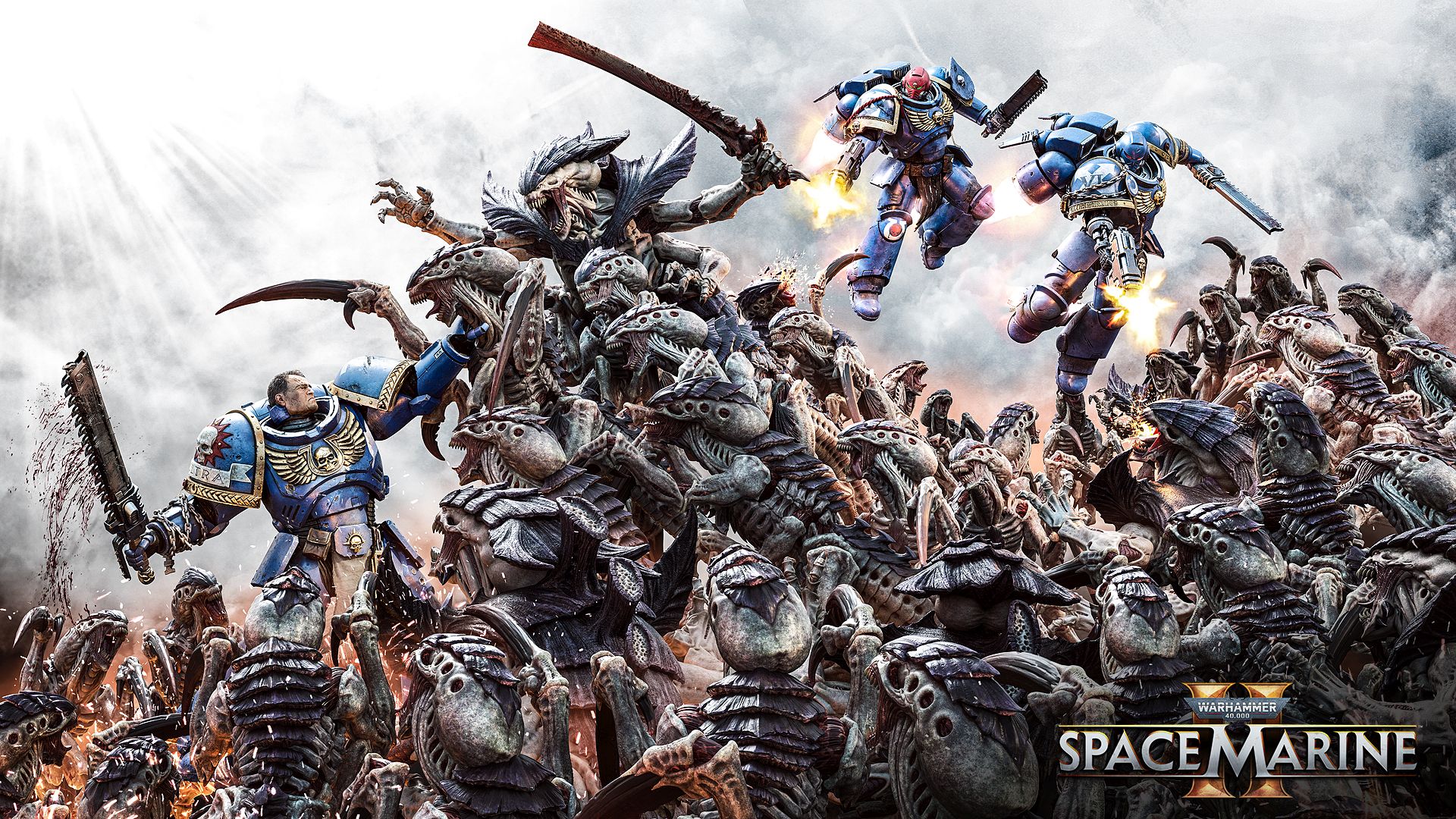
How Warhammer 40,000: Space Marine 2 Will Forge You into a Soldier in the 41st Millennium
Summary
- Creative Director Oliver Hollis on bringing galactic warfare to life in Warhammer 40,000: Space Marine 2.
- The core intention from the outset has been to give players a taste of what it’s like to be a Space Marine.
- Warhammer 40,000: Space Marine 2 launches for Xbox Series X|S on September 9, 2024, and is available to be wish listed on the Xbox Store.
The beauty of the Warhammer 40,000 universe is that nothing is simple, nothing is clear cut, and it’s made the production of Space Marine 2 an exciting and rewarding experience. How do you make two-and-half-meter tall psycho-indoctrinated killers into relatable characters that an audience will root for? This is the type of fascinating question you’re faced with when you involve yourself in the Warhammer 40,000 franchise, and I’m here to tell you more about this exciting endeavour!
Guiding Principles
Our core intention from the outset has been to give you a taste of what it’s like to be a Space Marine. To achieve this, we need gameplay that makes you feel empowered to a level far beyond your average shooter. Everything, from weapons, abilities, and combat mechanics, to sounds and visuals, needs to be infused with the immense power of a Primaris Space Marine. An example of how we’ve handled this is the lack of a cover system in the game. Space Marines rarely use cover because their armour is so good. Typically, forward is the only direction that matters.
Our second core pillar has been to convey the sense of scale that you find in all Warhammer 40,000 literature – you’ll find yourself equipped with devastating weapons, but also at the center of a brutal battle for supremacy. The carnage you witness must embody the epic scale of Warhammer 40,000 warfare. We’re talking about conflicts that take place on a galactic level; whole solar systems consumed by war. You can already get a glimpse of this in the trailers we’ve released so far, with shots showing the sheer number of enemies, the allied forces holding them back, the massive artillery bombardments and the battles raging in all three dimensions.
Finally, we’re committed to making Space Marine 2 feel like a Warhammer 40,000 story. This means working very closely with Games Workshop, along with some of their Black Library authors, to ensure that the story is faithful to the universe from which it is born.
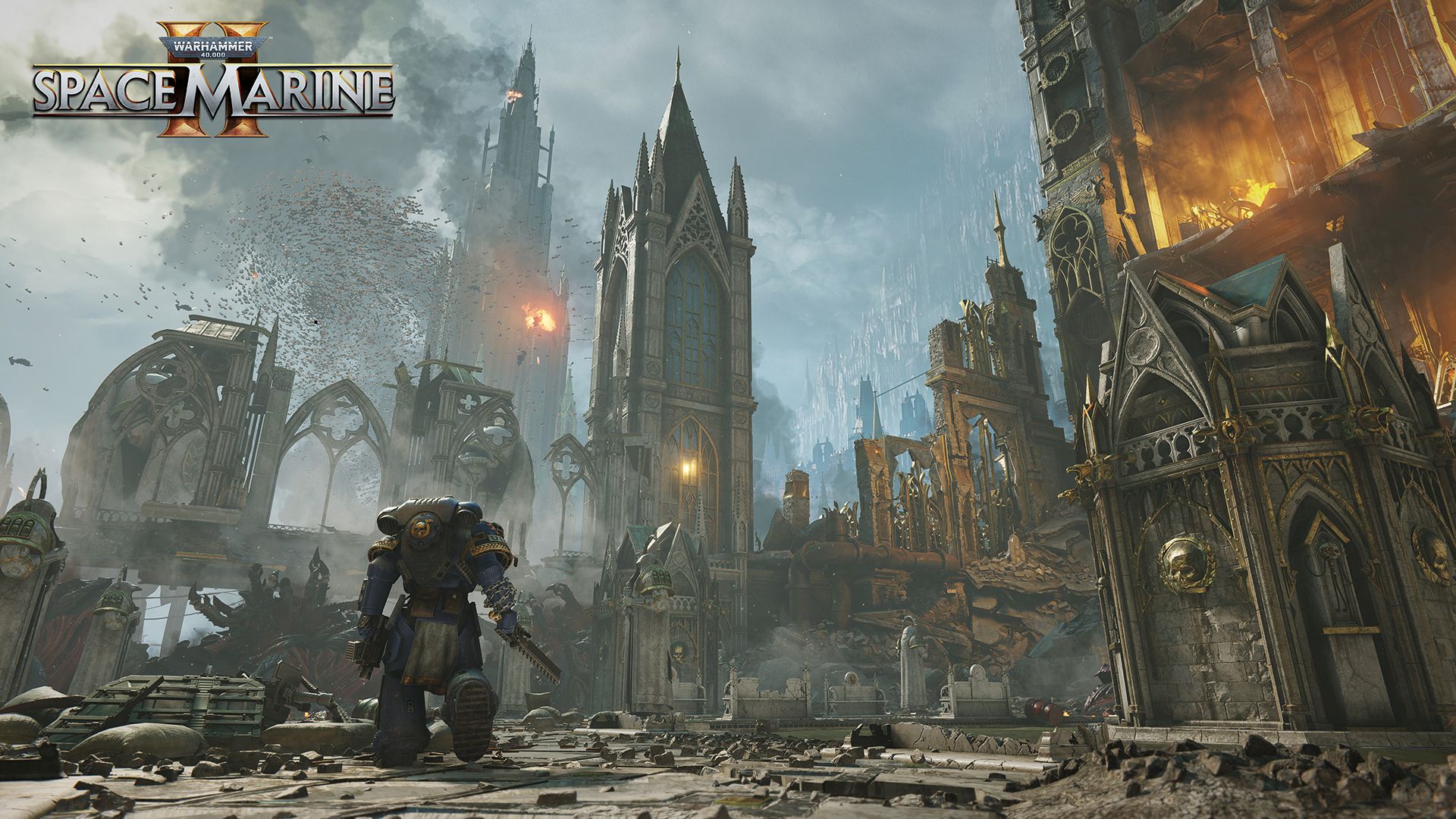
Gothic Style
The architectural style of the Imperium of Man in the world of Warhammer 40,000 is iconic. Even reading about it in the Black Library novels gives a clear sense of the extraordinary approach that Games Workshop have taken to this feature of their IP. In the ten thousand years of human history since the betrayal of the Emperor by his corrupted son, Horus, the Imperium has fiercely resisted change. The densely populated hive-cities of the Imperium are populated by huge, ancient, cathedral-like buildings, inhabited by creatures that carry the signature mix of brutal injuries and crude surgeries that you find throughout the Warhammer 40,000 galaxy. Towering monuments to heroes that long ago fell in battle, only to have their true identities lost in the vast expanse of time that followed.
Hive cities in particular are a fascinating concept. How do billions of people all occupy the same area of land? By rising up in towering adamantium spires that penetrate the clouds. Ornate termite mounds, adorned with a plentiful number of human skulls, the hive cities make mountains look like molehills.
In order to render these structures, these cities, as they were intended to be seen, we spent months soaking up as much official artwork as we could get our hands on. We met with Warhammer artists who specialise in creating these gothic vistas and then worked closely with the Warhammer licensing team at Games Workshop to go over every design with a fine tooth comb. We believe that the result is one of the best renderings of Warhammer 40,000 architecture in any 3D production.
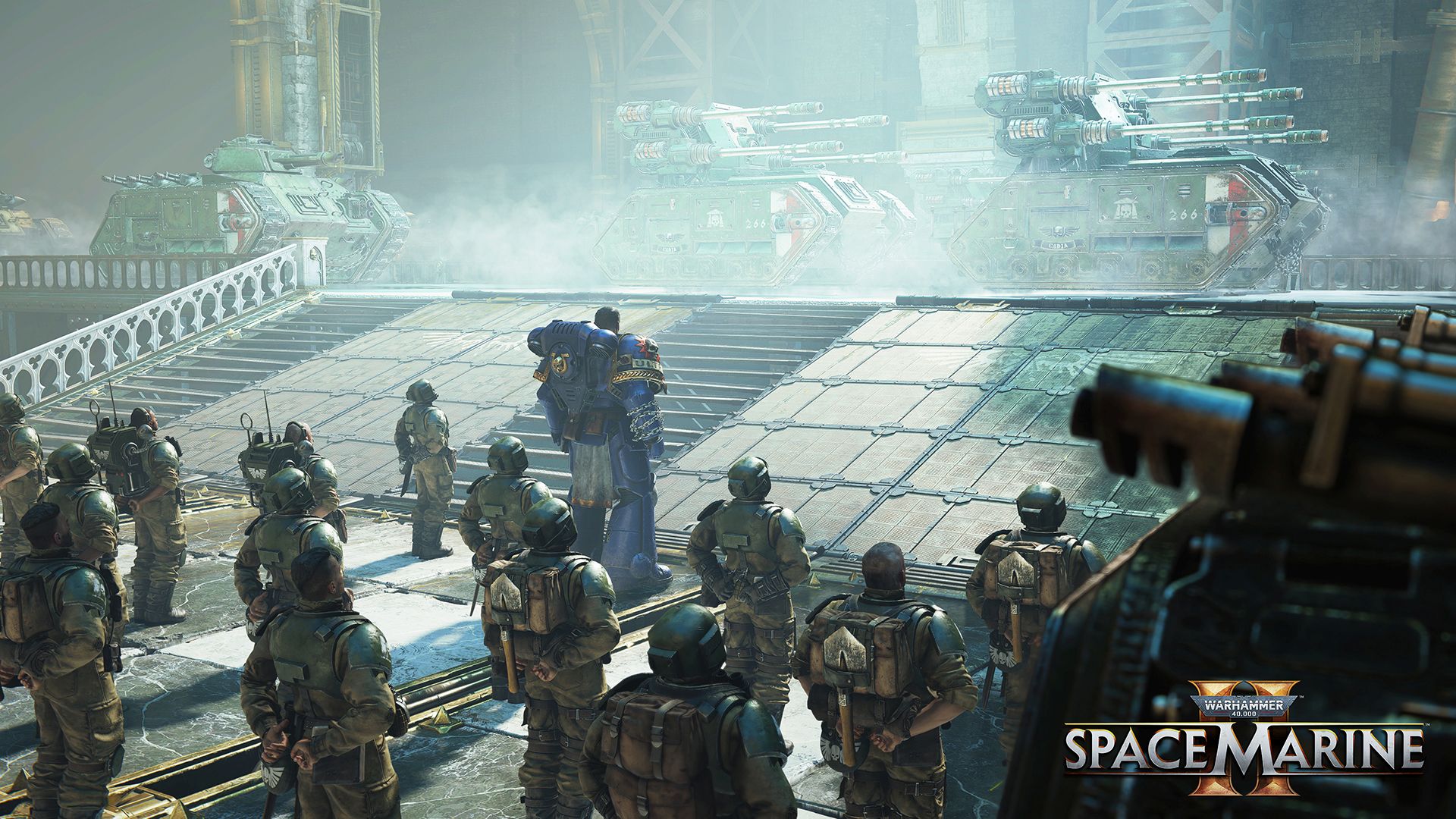
Epic Moments
Any epic moment must be earned. A crescendo is reached, rather than created in isolation. We were careful to weave a variety of narrative and visual threads together to produce these very special moments over time.
There are different ways to get there. Sometimes, it is a case of containing the player within a smaller environment, through dimly lit, narrow corridors, before opening a set of doors to reveal an immense vista with an enormous battle taking place as far as the eye can see. Other times, it’s a case of using visual and narrative cues to build up the importance of a giant bell that hangs ominously above our allied forces, before bringing it crashing down. Building up to these crescendos in a way that feels very satisfying requires every tool at our disposal. Imagery, sound, camera, narrative, and gameplay all do their part.
Being a Space Marine
In a game about being a Space Marine, you must be able to experience the essence of their condition. For them, warfare is not a job, nor a commitment. It is the only thing they know. They are humans who are surgically and genetically optimised for warfare. The level of devotion they feel is of a very different order. They’re functionally immortal, at least as far as anyone can tell, but they operate in such hostile warzones they rarely live more than a few hundred years at best. They are immortal, and yet their destiny is to die in battle, a paradox you should be able sense as you take on the role of Titus.
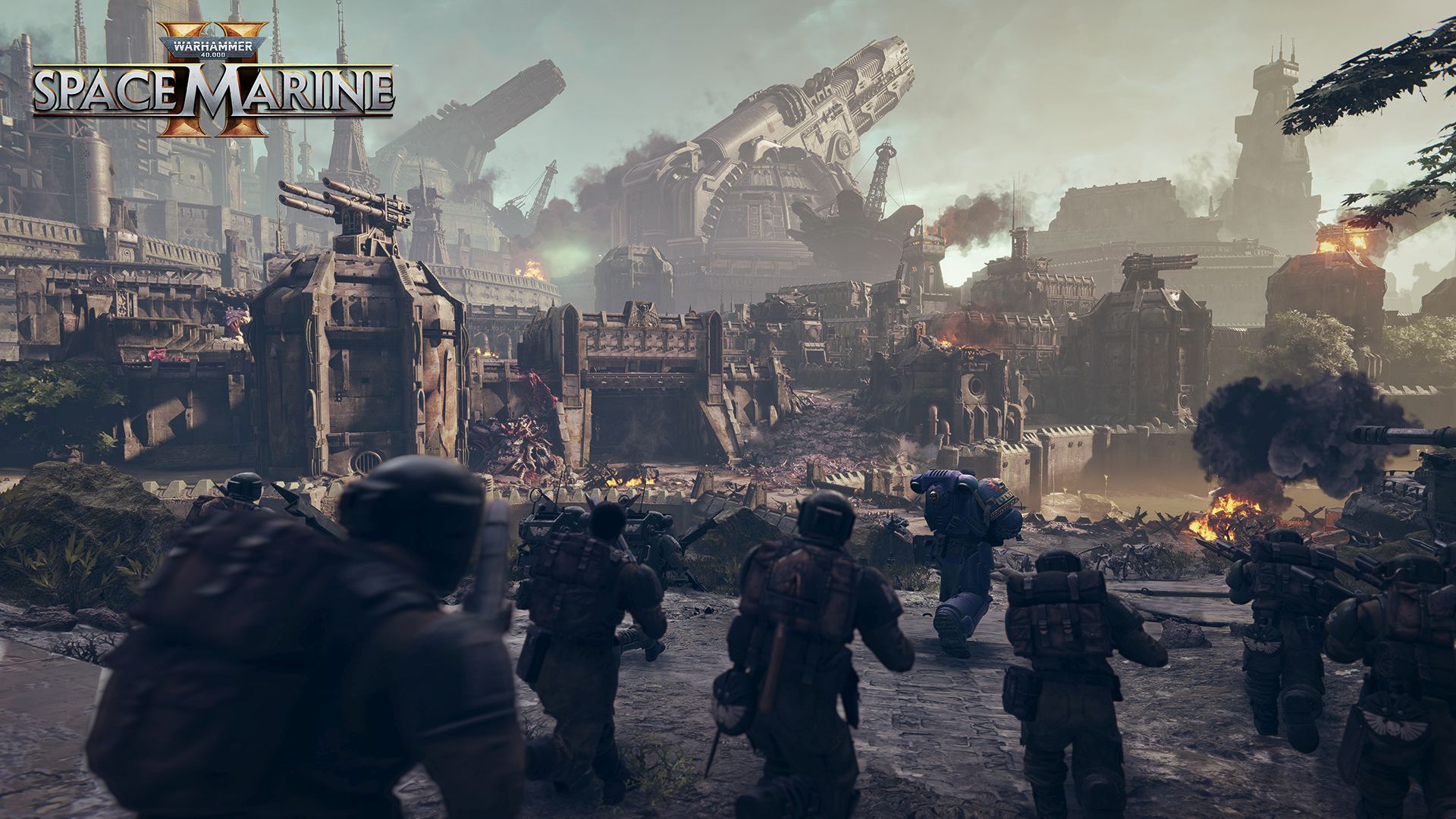
Some features are crucial to understanding what it means to be a Space Marine. Brotherhood, loyalty, devotion, the inability to feel fear and duty are all critical aspects. Space Marine 2 looks at the strength of brotherhood, especially from our main character, Titus’ perspective. It also explores the unwavering devotion possessed by every single Space Marine, and how far they will go to fulfil their task.
Portraying Titus
Titus was presented as unique from the very beginning. In the first game, it was his uniqueness that got him in trouble. He is not your average Space Marine, but nor is he equipped with any unique powers or abilities. It is his mind, the way he thinks, that makes him stand out.
Titus endows Space Marine 2 with fascinating themes. We know that a great deal of time has passed since the first game. So much has changed, with the return of the Ultramarines’ Primarch, Roboute Guilliman, and the emergence of the Primaris Space Marines. The story of Titus gives us the opportunity to look at how a Space Marine adapts to his circumstances, particularly when he has a unique way of understanding his world. Will he be able to overcome his past, his decisions, and his mistakes? Will he be able to adapt to a new environment? This is the story we can explore with our game.
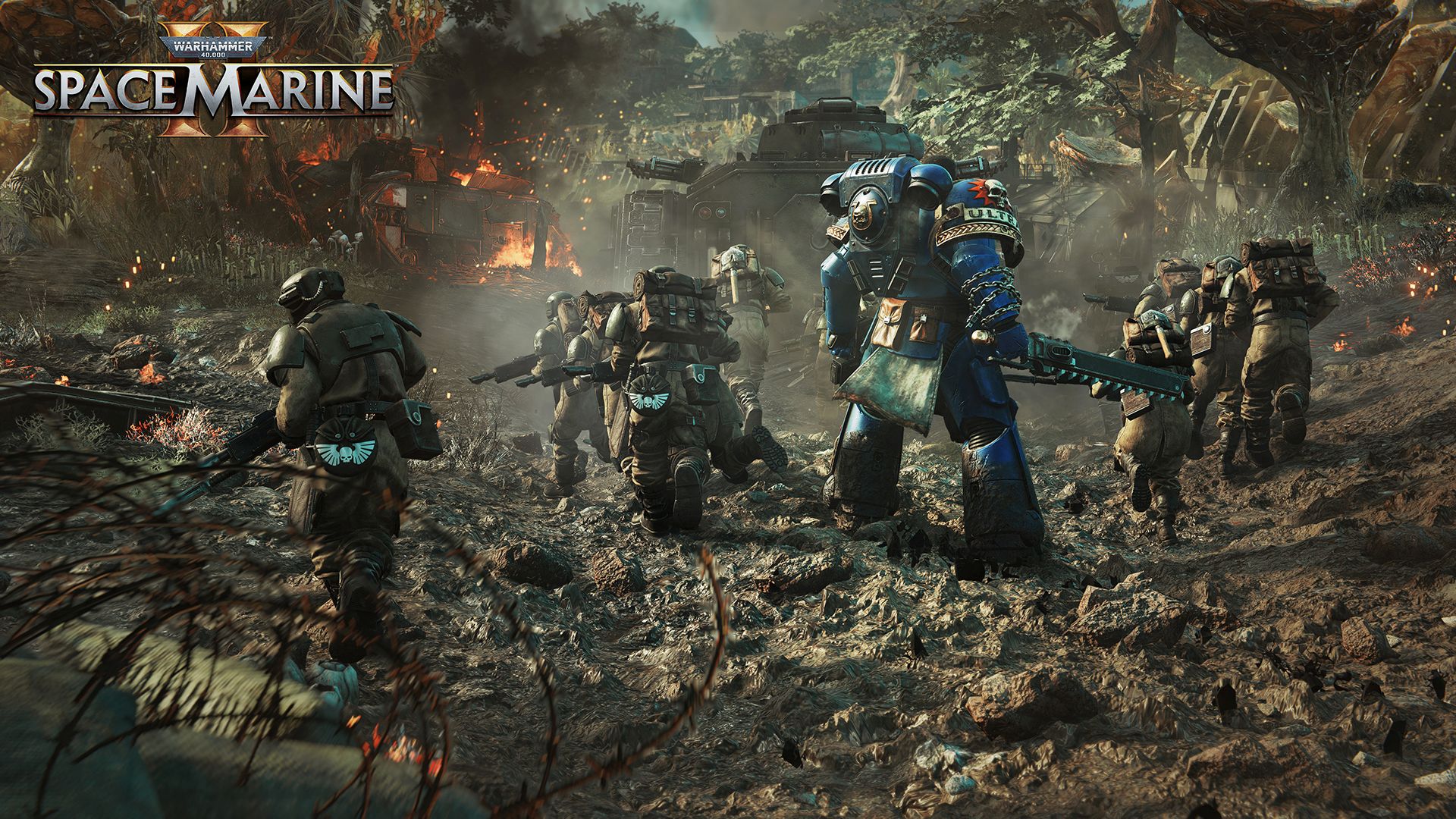
Learning From Cinema
Cutscenes can go a long way by using the language of cinema. The 3D medium makes anything possible with a camera, but that’s not always a good thing. It doesn’t matter how clever or how impressive a camera move can be; if it is detrimental to storytelling, it’s useless. Movies have spent more than a century refining visual storytelling and I’ve learned valuable lessons from Steven Spielberg, Terrence Malick, Emmanuel Lubezki, Paul Thomas Anderson, Andrei Tarkovsky, J.J. Abrams, and Ridley Scott. They’ve all shown that cameras can be used to great effect beyond simply framing characters in a scene.
Creating a story set in an epic universe runs the risk of having the characters disappear against the grand scale of the environment. Denis Villeneuve handled this very well in the new “Dune.” Director John Dower and I have been working closely on Space Marine 2 to tackle this challenge. Thanks to a solid background in film and TV, John always places character and story center stage, steering away from flashy sequences and show pieces. Every tool at your disposal should be used to keep the characters in focus when all hell is breaking loose around them. Lens choice, composition, movement, pacing… it all contributed to rooting our approach in the methods of the physical realm. And that’s how we grounded scenes to give the viewer a sense of really being present.
Music for the 41st Millennium
Going down a conventional route with the score for Space Marine 2 would have been easy, but it would have been a terrible mistake. Just because our story takes place in the distant future, it doesn’t mean the music should sound futuristic. It’s a very interesting and tricky balancing act, for which we’ve had to consider the setting of Space Marine 2.
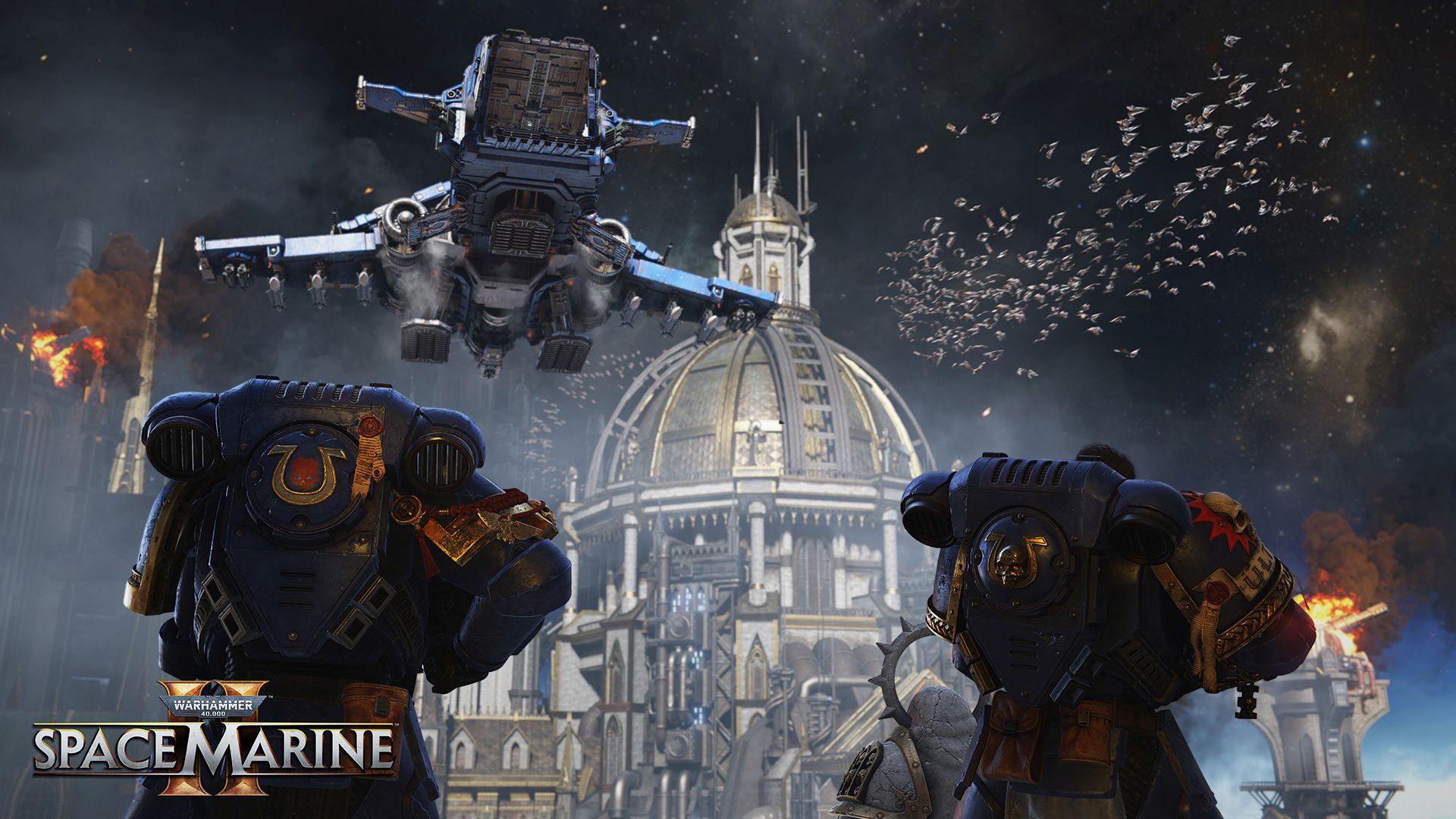
The Imperium of Man has passed through an Age of Technology so advanced that it afforded mankind faster-than-light travel, teleportation and the Standard Template Construct machine, an artificially intelligent computer database… yet all that progress has since slipped into a forgotten history for tens of thousands of years. Now, the Imperium is a civilization that seems to abhor progress, that roots itself in tradition and dogma. You will not find the towering glass buildings and ubiquitous holographic projectors of “Blade Runner,” nor the slick, clean promenades of “Star Trek.” Instead, gothic architecture, millions of human skulls built into walls, stained glass windows and candle wax covered altars are the staple of the 41st millennium.
With all of this in mind, we worked to find a musical style that features both the accepted technology of the Imperium and the traditional instruments that have served humanity for millennia. The Warhammer 40,000 IP also has many established musical conventions that we wanted to build on. The result is something that feels very familiar but that has been touched by the movement of time. Technology may have changed and shaped the galaxy, but humans are still very much human.
Thanks for reading this deep dive into what makes the Warhammer 40,000 universe such a rich and exciting setting to work. I hope it has left you hungry for more! We can’t wait for you to jump into the action yourself on September 9, 2024, when Warhammer 40,000: Space Marine 2 releases on Xbox Series X|S!
